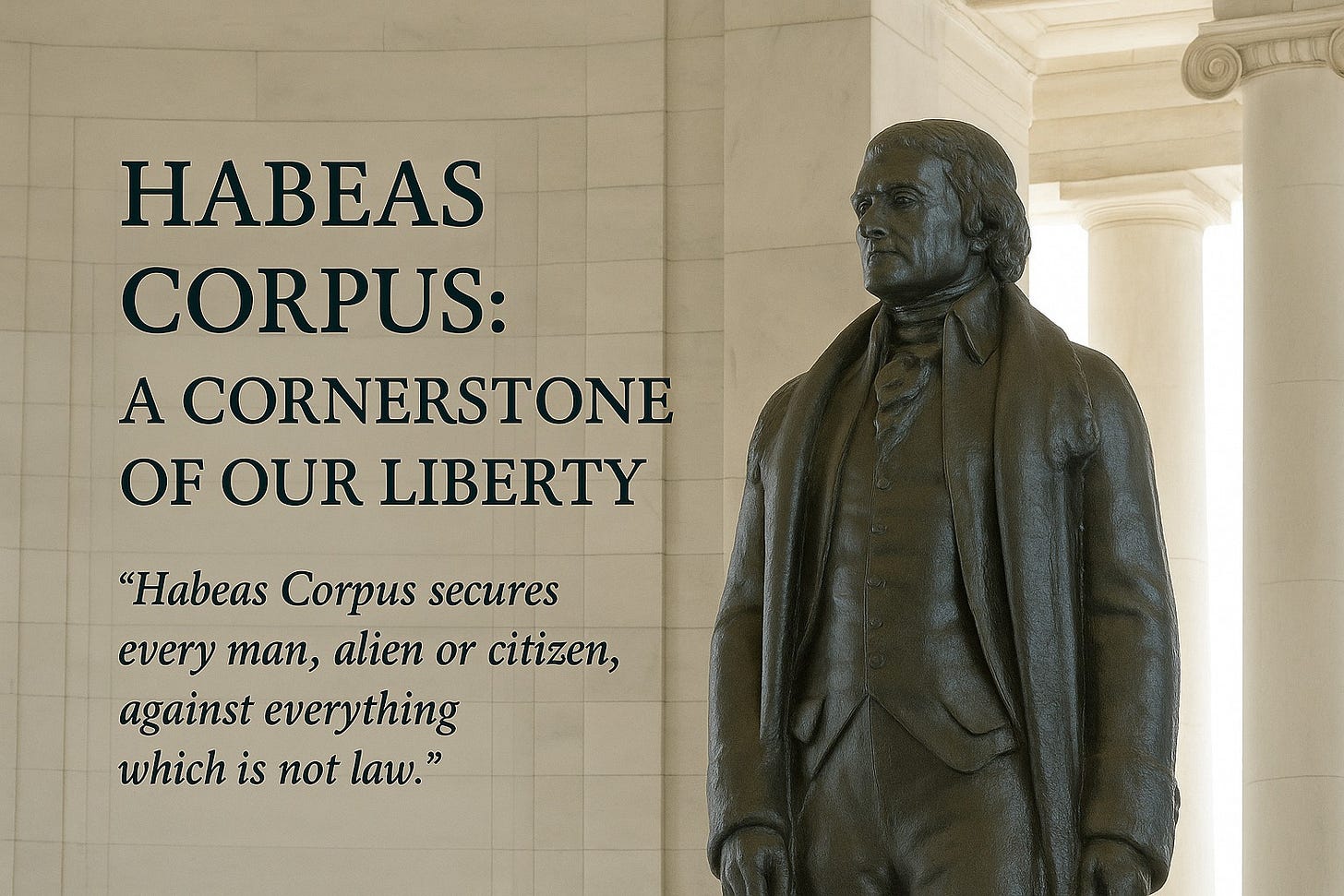✍️ Habeas Corpus: A Cornerstone of Our Liberty
When a foundational right briefly vanishes from an official congressional website, it’s a warning—not a fluke.
The right of habeas corpus—to challenge unlawful detention—is again under threat in 2025. The Trump administration is expanding detention powers and targeting dissent.
Habeas corpus is a principle that dates back to the earliest days of our republic. It’s not just a historical safeguard; it’s a modern necessity.
As we face unprecedented challenges to civil liberties, it’s worth recalling the words of Thomas Jefferson, who wrote: “Habeas Corpus secures every man, alien or citizen, against everything which is not law.”
Jefferson wrote that in a 1798 letter during a debate over the Alien and Sedition Acts. Those laws allowed the deportation of immigrants deemed “dangerous” and criminalized criticism of the government.
Jefferson, alarmed by Federalist overreach, stressed that habeas corpus was a crucial safeguard against such abuses. It ensured that no one could be held without a legal reason.
That principle appears in Article I, Section 9 of the U.S. Constitution. It prohibits suspension of the writ of habeas corpus “unless when in Cases of Rebellion or Invasion the public Safety may require it.”
Courts have long interpreted that limit strictly. During the Civil War, President Lincoln suspended the writ—but only in response to armed rebellion.
In Ex parte Merryman (1861) and later rulings, courts confirmed that suspension is allowed only during true national emergencies—not to silence political critics or immigrants seeking asylum.
Yet in recent months, new executive orders have made it harder for detained migrants and protestors to get hearings, legal counsel, or due process. These actions, often justified as “security measures,” test the limits of constitutional authority.
And for several hours on Aug. 6, 2025, a description of the constitutional clause protecting this right and others vanished without notice from an official congressional website.
The Constitution Annotated site showed broken links for Article I, Sections 9 and 10. A website message later blamed “coding issues. But the unexplained gap is a chilling warning about how vulnerable public access to constitutional truth can be.
This wasn’t just a technical glitch. It symbolized the erosion of core freedoms in plain sight.
While the text was restored, it raised new concerns. The current annotation on habeas corpus focuses mostly on recent court decisions that limit its reach, especially for asylum seekers.
It’s unclear what the annotation said before the glitch. But it now emphasizes newer laws and narrower interpretations over the broader historical importance of habeas corpus as a defense against government abuse.
It’s possible that the content was being rewritten during the outage to reflect current political goals. That shift in focus, subtle but real, is a reminder that the interpretation of our rights can be shaped to fit an agenda.
Access to the full meaning and history of our rights must never be taken for granted.
The suspension of habeas corpus is not just a theoretical concern. It’s a direct threat to our democracy and freedom.
Related Commentaries
The Oval Office Isn’t a Courtroom ➤ On how executive overreach is echoing bills of attainder—punishing without trial—and why those constitutional protections matter more than ever.
What’s a Foreign Gift Worth? The Constitution Says: Not Our Democracy➤
A companion commentary on how constitutional safeguards against corruption—and the public’s access to information about them—are also at risk.
Take Action
Contact your U.S. senators and representative. Urge them to defend habeas corpus—no matter the political climate.
Support advocacy groups like the ACLU and the Center for Constitutional Rights. They fight to protect civil liberties, including habeas corpus.
Check out other resources at Plainly, Garbl:
Bill of Rights: Due Process, Equal Protection, Habeas Corpus
A ranked guide to advocacy groups defending core constitutional protectionsLegal Resistance for Justice
A ranked guide to legal groups challenging anti-democratic policies and abuses of power.Executive Overreach & Abuse of Power
A ranked guide to organizations resisting authoritarianism and defending democratic norms.
Together, we can ensure that this vital protection remains a strong pillar of American freedom.


